 Petzlover
Petzlover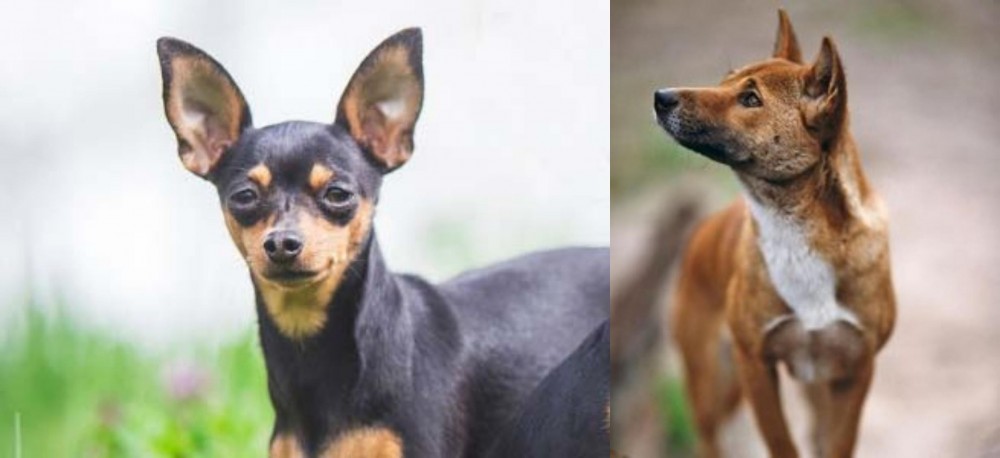 Prazsky Krysarik is originated from Czech Republic but New Guinea Singing Dog is originated from Papua New Guinea. Prazsky Krysarik may grow 15 cm / 5 inches shorter than New Guinea Singing Dog. Prazsky Krysarik may weigh 11 kg / 24 pounds lesser than New Guinea Singing Dog. Prazsky Krysarik may live 6 years less than New Guinea Singing Dog. Prazsky Krysarik may have less litter size than New Guinea Singing Dog. Prazsky Krysarik requires Low Maintenance. But New Guinea Singing Dog requires Moderate Maintenance
Prazsky Krysarik is originated from Czech Republic but New Guinea Singing Dog is originated from Papua New Guinea. Prazsky Krysarik may grow 15 cm / 5 inches shorter than New Guinea Singing Dog. Prazsky Krysarik may weigh 11 kg / 24 pounds lesser than New Guinea Singing Dog. Prazsky Krysarik may live 6 years less than New Guinea Singing Dog. Prazsky Krysarik may have less litter size than New Guinea Singing Dog. Prazsky Krysarik requires Low Maintenance. But New Guinea Singing Dog requires Moderate Maintenance
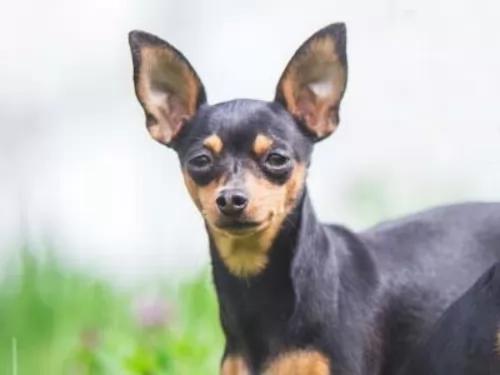 You won’t find this dog outside the Czech Republic, which is a pity, because as one of the smallest breeds, it’s a great choice for people with small properties.
You won’t find this dog outside the Czech Republic, which is a pity, because as one of the smallest breeds, it’s a great choice for people with small properties.
It’s not a new breed, and there are records of it having been around in the Middle Ages, being valuable for catching rats.
The breed went through a decline in the 1980s, but their breeding program was started, although it isn’t an FCI acknowledged breed.
 In 1957 the New Guinea Singing Dog was “discovered” in the Highlands of Papua New Guinea and he is found no where else. There is a lot of debate among scientists, taxonomists and biologist as to what is really a species and what is a subspecies. When the NGSD was found he was classified as a new canid species then in 2007 they were downgraded to a subspecies.
In 1957 the New Guinea Singing Dog was “discovered” in the Highlands of Papua New Guinea and he is found no where else. There is a lot of debate among scientists, taxonomists and biologist as to what is really a species and what is a subspecies. When the NGSD was found he was classified as a new canid species then in 2007 they were downgraded to a subspecies.
Today the NGSD is considered to be a wild dog and a primitive dog. They have lived in Papua New Guinea in the Highlands for thousands of years. They are closely related to other wild dogs, such as Australia’s dingo. They are today as they were a thousand years ago – wild. So wild that many counties have them in their zoos.
With the right care and enough socialization, they do very well as companion animals living with people. They are difficult to domesticate however and the person who owns one should be a part of the NGSD community in order to get support, share issues, and learn from others who have lived with these “wild dogs” for many years.
Any New Guinea Singing Dog found in North America or Europe is a direct descendent of two couples that were taken to zoos in China and Australia. The NGSD makes a howling sound that modulates and undulates through a wide series of tones. No other dog makes this musical sound. Rare even in New Guinea today, the Singer is thought to be the rarest of all dogs.
The only organization that recognizes the Singing Dog is the UKC and they are allowed in UKC competition. The NGSD now holds the classification of a domestic dog – a Canis lupus dingo - which is a subspecies of Canis lupus. In 2016 a group of 15 wild dogs were photographed for the first time ever. Prior to this the NGSD were never seen in more than pairs.
It is believed that they do not live and operate in packs, but rather solitary, pairs or family groups where both the parents do the work of raising the pups.
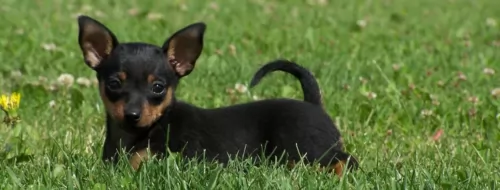 The Pražský Krysařík is a small dog standing at between 20 and 23cm in height and weighing between 1.5 and 4kg.
The Pražský Krysařík is a small dog standing at between 20 and 23cm in height and weighing between 1.5 and 4kg.
The Prazsky Krysarik may be small, but he is robust with a broad chest and a lean body with a fragile, lizard like head, much like a Chihuahua. The legs are fragile and thin. The ears are fairly large and erect and he has a long tail. The coat is short, thin and glossy and is mostly black and tan.
The Prazsky is known for its playful, lively nature, and they’re spunky and intelligent dogs too and will be more than capable of being trained and socialized.
Even though he is such a tiny dog, it will be to his benefit to have him trained and socialized.It makes the dog well balanced and they become well behaved so you can take them anywhere.
They are such friendly, social little dogs too and they love being around their human family. They certainly don’t like being left in the backyard, cut off from their human companions.
They're small enough to be indoors a lot, being able to easily slot into life in the city or in the countryside. They get on well with children and other pets but kids will have to be taught how to treat him with kindness and respect, as those tiny little legs could snap.
 The New Guinea Singing Dog is a medium sized dog with short legs and a broad head. They are about average height and they are very limber and flexible. They can rotate their paws and spread their legs at much greater angles than the average canine. Thus, they can easily climb a tree. They can jump like a cat.
The New Guinea Singing Dog is a medium sized dog with short legs and a broad head. They are about average height and they are very limber and flexible. They can rotate their paws and spread their legs at much greater angles than the average canine. Thus, they can easily climb a tree. They can jump like a cat.
They have very reflective eyes that are shaped like almonds and have dark rims. The color of the eye can be dark brown to dark amber. It is also believed that they can see better than other domestic dogs in low light settings. Their pupils let in more light due to pupils that are wider than most other dogs.
The ears of the NGSD are lined with fur, pointed and erect. The are forward laying and can be rotated in order to hear even the farthest and faintest of sounds. There are dark guard hairs on the spine and back of the ears and tail. On young dogs the muzzle is black but by age 7 it is already beginning to turn gray.
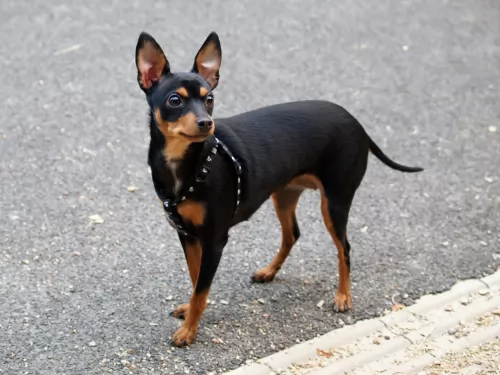 A Prazsky is a dog just like any other – he just wants to be a member of the family. He badly wants the love and attention of his human family but he wants to give love and attention in return too.
A Prazsky is a dog just like any other – he just wants to be a member of the family. He badly wants the love and attention of his human family but he wants to give love and attention in return too.
They make wonderful pets and he is more than willing to put aside playing outdoors to come inside and just be by your side.
These little dogs are a great choice for those looking for a small-sized dog. They’re such friendly, responsive little dogs and they don’t come with many health-related issues. The Prague Ratter adapts well to city or country living and he is prepared to be loyal and loving wherever you take him.
 They could be, but it must be remembered that this is a wild dog.
They could be, but it must be remembered that this is a wild dog.
Varying the pitches when howling
It’s possible but not recommended. Leave them wild.
Highly intelligent but trainability is questionable unless well socialize and attached to their people.
 The Prazsky is a robust dog but there are some diseases that can affect a dog, and skin symptoms such as itchiness or an unusual lump will need to be seen to.
The Prazsky is a robust dog but there are some diseases that can affect a dog, and skin symptoms such as itchiness or an unusual lump will need to be seen to.
Other problems such as excessive drooling, cloudy eyes with discharge, distended abdomen and discolored gums are all reasons to seek the help of your vet. Small dogs like this tend to be prone to dental disease, so keep an eye on his teeth.
Some people look at buying health insurance because they know too well that veterinary costs can add up quickly, even for a tiny little dog like this.
 Though the breed is not extinct – it is so wild and secretive that there is no history or record of any health problems. However, the small number of domestic companion animals have shown health issues in recent years.
Though the breed is not extinct – it is so wild and secretive that there is no history or record of any health problems. However, the small number of domestic companion animals have shown health issues in recent years.
Pancreatitis – can be chronic or acute. If chronic it needs to be treated and diet changed. If acute it is usually deadly.
Hip Dysplasia – can cause lameness or arthritis.
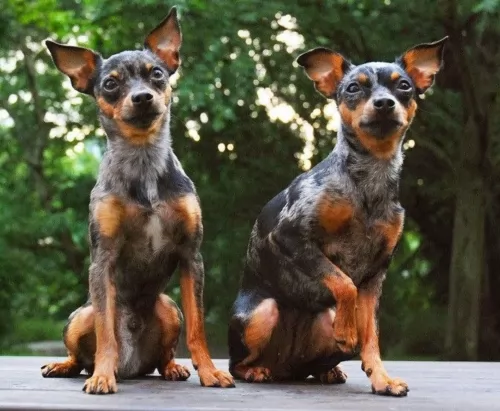 It doesn’t matter what size dog you have, each one requires high quality dog food, whether commercially manufactured or home-prepared.
It doesn’t matter what size dog you have, each one requires high quality dog food, whether commercially manufactured or home-prepared.
Portion sizes should be appropriate to your dog’s size and activity levels. Dogs thrive on simplicity when it comes to food as this prevents them having digestive problems. Boiled chicken, brown rice or pasta and sweet potatoes, spinach and carrots all chopped up and added to your dog’ dry kibble as a treat every now and again will do wonders for your pet.
Fresh, cool water should always be available to your pet around the clock.
The short, smooth coat of the Pražský Krysařík makes him a truly low maintenance little dog. Just give him a brush twice a week and wipe him down with a damp cloth and he’ll always be gleaming like a new penny.
Have his nails trimmed and always check his teeth during these grooming sessions. Smalls dogs battle with dental disease, and this can cause havoc in the body of your small pet.
Walk your tiny pet at least once a day. It just gives him the chance to sniff around a bit and see the world in a new light. He doesn’t require a lot of physical activity, but they will still need regular exercise to stave off obesity.
Get your Pražský Krysařík spayed or neutered if you’re not intending to allow your pet to have puppies. These little dogs can have between 1 – 3 puppies. There are many pros to this procedure for dogs.
Make sure his vaccinations are up to date to avoid some of the deadly dog diseases you get such as parvo-virus, distemper and rabies.
 In the wild both pups and adults are thought to eat small mammals and birds as well as fruits. In homes feed a high protein diet. Because of the tendency toward pancreatitis do not feed raw or under cooked meat. If feeding meet do so in small amounts well cooked, very lean. Stay away from the fat. Feed puppies very small amounts. ¾-1 cup high quality dry puppy food twice a day.
In the wild both pups and adults are thought to eat small mammals and birds as well as fruits. In homes feed a high protein diet. Because of the tendency toward pancreatitis do not feed raw or under cooked meat. If feeding meet do so in small amounts well cooked, very lean. Stay away from the fat. Feed puppies very small amounts. ¾-1 cup high quality dry puppy food twice a day.
Same as the puppy when it comes to meat although you could give the adult a little more. 1 ½ cups od high quality medium breed dog food twice a day.
In the wild there is no indication of health issue. A very healthy breed.
The NGSD needs a lot of stimulation both mental and physical. They must have a daily walk and somewhere to run. They are escape artist in homes. Remember they can jump like cats and climb trees. If their head can pass through a hole, so can the rest of their body.